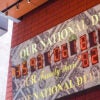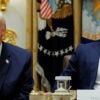On December 23, 1783, General George Washington resigned his commission as Commander-in-Chief of the Army to Congress, which met then in the State House in Annapolis. Both Washington and Congress recognized the importance of the occasion, and the ceremony was carefully organized by a Protocol Committee headed by Thomas Jefferson. The scene was described by James Tilton, delegate from Delaware:
Tuesday morning, Congress met and took their seats in order, all covered. At twelve o’clock the General was introduced by the secretary, and seated opposite to the president, until the throng, that filled all the avenues, were so disposed of as to behold the solemnity. The ladies occupied the gallery as full as it would hold, the Gentlemen crowded below stairs. Silence ordered, by the Secretary, the General rose and bowed to congress, who uncovered, but did not bow. He then delivered his speech, and at the close of it drew his commission from his bosom and handed it to the president. The president replied in a set speech. The General bowed again to Congress. They uncovered and the General retired. After a little pause until the company withdrew, Congress adjourned. The General then stepped into the room again, bid every member farewell and rode off from the door, intent upon eating his Christmas dinner at home. Many of the spectators particularly the fair ones, shed tears on this solemn and affecting occasion.
So affecting was the occasion that, at the ceremonial dinner the previous night, Tilton reported, “Every man seemed to be in heaven or so absorbed in the pleasures of imagination, as to neglect the more sordid appetites, for not a soul got drunk, though there was wine in plenty.” The guests were right to anticipate the next day’s ceremony would be special: not only did Washington’s speech provoke tears, but the General’s hands shook so badly as he read that he had to take the paper in both hands to steady himself. For Washington, who prided himself on his discipline, this was a rare display of profound emotion.
And his words were great ones, worthy of appreciation then, and of remembrance now. Washington’s text was remarkably short – only 339 words. In them, he resigned his commission, twice expressed his gratitude to Providence (or “Almighty God”), and commended the officers on his staff and the Army as a whole to the care of Congress. But his central concern, as so often before and after 1783, was that the U.S. become a “respectable” nation. Victory in the War of Independence was not the end of the struggle: that “momentous Contest” had only created the opportunity to achieve respectability. In Washington’s words:
Happy in the confirmation of our Independence and Sovereignty, and pleased with the opportunity afforded the United States of becoming a respectable Nation, I resign with satisfaction the Appointment I accepted with diffidence. A diffidence in my abilities to accomplish so arduous a task, which however was superseded by a confidence in the rectitude of our Cause, the support of the Supreme Power of the Union, and the patronage of Heaven.
For Washington, respectability was based on confirmed “independence and sovereignty.” That was not all that was needed: he was already concerned that the Union would not be respectable “unless adequate Powers are given to Congress for the general purposes of the Federal Union.” But independence and sovereignty were the indispensable beginning, for without them, the United States would be unable to undertake all the other necessary measures. It would be dependent, even divided, and likely to revert to European control. Independence was essential to liberty; sovereignty was essential to well-ordered liberty.
In our era, sovereignty is far too often a dirty word. Washington was wiser. The Heritage Foundation believes that the values and ideas that motivated our Founding Fathers are worth conserving. George Washington’s speech at Annapolis expresses those values and ideas with unrivaled clarity. In celebrating the 4th of July, we pay tribute not only to his achievements as a great American, but to his insight as a friend of true liberty.































4 Replies to “Happy in the Confirmation of Our Independence and Sovereignty”